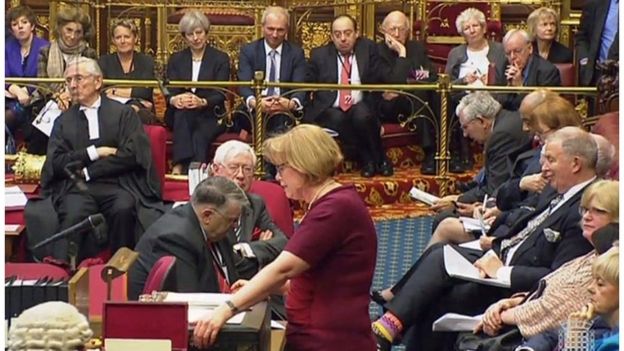Commons set for Brexit vote showdown-UK
GB news 24 desk//
The row over how much of a say MPs should get in the Brexit process returns to the House of Commons later.
On Monday, the House of Lords again defeated the government over giving MPs a “meaningful vote” on the outcome of negotiations between the UK and the EU.MPs now have to decide whether they agree with the Lords or with the government.With several Tories threatening to vote against the government, numbers in the Commons are expected to be tight.The UK is due to leave the European Union on 29 March 2019 and negotiations have been taking place over the terms of its departure.The tussle between the Commons and the House of Lords, known as Parliamentary ping-pong, focuses on what happens if the UK government cannot or does not reach a deal with the EU.The change to the EU Withdrawal Bill put forward by the Lords would give MPs a greater say in these scenarios.Labour has urged its MPs to support the Lords’ amendment, describing it as the “last chance” for Parliament to guard against “a no-deal Brexit” which it says would damage the economy.But the government says giving Parliament the power to intervene in negotiations would bind Theresa May’s hands in the talks.But the would-be rebels were unhappy at the government’s subsequent offer to meet their concerns, describing it as a “slap in the face”.
On Monday the government was defeated by 119 votes in the Lords, who tabled a new amendment which would mean MPs have to “approve” whatever the government decides to do if there is no Brexit deal.
MPs will debate and vote on these two rival amendments later when the bill returns to the House of Commons.
Theresa May’s Conservatives do not have a majority in the House of Commons, and ministers will be hoping Tory MPs unhappy at what has been offered so far do not decide to rebel this time.
As well as what the would-be Tory rebels choose to do, the number of Labour MPs voting with the government could also be a key factor.
The sticking points
 Image copyrightHOUSE OF LORDS
Image copyrightHOUSE OF LORDSThe debate centres on what happens in three Brexit scenarios:
- If MPs vote down the UK-EU Brexit deal
- If Theresa May announces before 21 January 2019 that no deal has been reached
- If 21 January passes with no deal being struck.
Under these circumstances, the government has said, a minister will make a statement in Parliament, setting out the proposed next steps.
MPs will then vote on this statement. According to the government, this vote should be “on neutral terms”, with MPs simply noting what has been said.
But the Lords’ amendment goes further, saying MPs should have to “approve” the minister’s statement.
One of the leading Tory rebels, former attorney general Dominic Grieve, has said he hopes Downing Street will take note of the Lords vote and that the two sides can resolve their differences in a way that “honoured” the trust that he and other MPs had placed in Theresa May following their meeting with her last week.
“I am hopeful the government will listen to what has come back from the Lords and we may be able to achieve some form of sensible compromise,” he said on Tuesday.
“The differences between us is not very great, but it is a significant difference.
“It is absolutely right Parliament cannot micromanage the government’s negotiating.
“To be absolutely clear, if this amendment was carried in the Commons, it would not force the government to do something.”
EU has ‘serious’ differences with UK
Meanwhile, the EU has said there are “serious divergences” with the UK on a key issue in the negotiations – what happens to the border between Northern Ireland and the Republic after Brexit.
The UK and the EU have published a joint statement outlining the progress that has been made in the talks so far.
The EU’s chief negotiator, Michel Barnier, praised the “dedication and commitment” of the negotiating teams, and said progress had been made in “separation issues” like customs, VAT and the European nuclear agreement, Euratom.
Repeating his call for a “fully operational backstop” to prevent a hard border in Northern Ireland, he added: “Today marks a step forward in these negotiations. but a lot more work needs to be done before October.”


